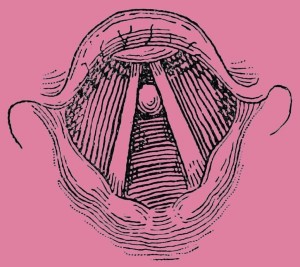Big Girls Don’t Fry
Boy, could my mother sing! She had great pitch, timing, and phrasing. And she loved to sing. She would belt out those romantic songs from her era: “Because of You,” “All of Me,” “Always.” She would even sing to me in my crib to comfort me.
Even before I arrived on the scene, my mother would try o ut for the yearly show at St. Jerome’s, her parish in the Bronx. With her great voice, she was always chosen. Everyone from the neighborhood would show up; everyone except my father, Harry.
ut for the yearly show at St. Jerome’s, her parish in the Bronx. With her great voice, she was always chosen. Everyone from the neighborhood would show up; everyone except my father, Harry.
Although they were only going steady at the time, his not showing up seemed to be significant, as even my Aunt Marie found it necessary to mention it to me when I was in my twenties. It was as if he didn’t like sharing her with anyone. But there was even something more. He was uncomfortable seeing her on a stage and being that big.
So many times at the Beach Club, my parents and their friends would be sitting around the bar having a few, and someone, usually Uncle Tommy, would break out in song. They would go through all the top songs of their youth, and the ones that gave them solace during WWII. Eventually someone would ask my mother to sing. Her signature song was “Because of You.” She would start singing the song straight, but then to manage my father’s discomfort, when she got to the second bar she would go off-key. Instead of belting out the song like she knew how to do, she went for the laughs. Everyone would crack up, saying, “Oh that Dottie, she’s such a pistol.” Harry would laugh along with the rest.
I remember hearing about it one morning over breakfast, when they were recalling what a fun time they had the night before. As my mother told me about it, even to my teenage brain, something did not ring true. I had the feeling that she was trying to convince me of something she didn’t believe herself. It felt forced. I remember feeling sad for her. I felt sad that she was apologizing for her great voice and deflecting the attention away from her by hiding her true talent. I guess going for the laugh was more palatable for my father. This way, no one could take her seriously.
Going for the laugh was her way of diminishing her power and talent, and she even tried to enroll me. I was always the kind of kid that friends confided in. They trusted me with their secrets. They would ask my advice, and I gave it. In high school, I was elected editor of the Freshman Newsletter. Since I was known for my “Dear Abby” skills, it was suggested that I write an advice column. So I put a box out for the freshman girls to leave their questions in. When I told my mother what I was up to, she told me, “You have no business giving advice!”
I protested, “But they really like my advice. I’m good at it!”
She said, “Why don’t you just answer the letters in a jokey way?”
The message was clear: Diminish yourself, fit in, and don’t own what you know.
It made me feel sick, but I did it. When the newsletter was published, each letter writer took me aside and asked, “Why did you do that? I was counting on you to answer me.” At fourteen, all I could say was, “My mother wouldn’t let me, but I’ll answer you now in private.” So began my first counseling practice, in private, in the hallways and stairwells of my high school, where no one could possibly get the wrong idea, that I knew what I knew.
I would sit there so proud of her, a rare opportunity for me, as she would get up and begin, “Because of you there’s a song in my heart, because of you my romance had its start.” I would hold my breath, whispering to myself, “This time, sing it straight. Go for it.” And then it would come. My body would wince at the first off-key note. My heart would sink, seeing that once again she ripped herself off. I would look around, thinking, “You people really think this is funny? She can really sing. Why do you all settle for this?” My body would wince until she finished, and I would exhale one very disappointed breath.
Sadly I find myself going into a body wince a lot lately. There’s an epidemic of women using what is called “vocal fry.” It is a voice affectation where a woman adds an irritating, gravelly sound at the end of a sentence. It even happens on my favorite radio station, NPR, which generally encourages women to speak from their authentic self. As I was listening to an NPR report, a female doctor was asked for her opinion. But when she opened her mouth, I winced. There it was: vocal fry. Her voice sounded like fingernails on a blackboard.
When I hear vocal fry, it sounds to me like an updated version of how my mother backed away from her true voice.
It’s the sound of a female apologizing for being who she truly is.
A few months ago, NPR’s Ira Glass even did a segment about it on his show This American Life. I was shocked that the conclusion drawn by Glass was, “If people are having a problem with these reporters on the radio, what it means is they’re old.” This is a bit simplistic.
It overlooks the fact that vocal fry is actually a symptom of the deeper problem of women feeling the need to apologize—when there is no need for it.
The cutting edge comedian Amy Schumer got a lot of attention when in one of the episodes of her TV show, she did a bit where a panel of woman experts, in spite of all their credentials, kept needlessly apologizing throughout the discussion. The episode went viral.
Author Sloane Crosley even did an op-ed piece for the New York Times based on the Amy Schumer episode. Its title was, “Why Women Apologize and Should Stop.”
She did a great job of breaking down the feminine pathology behind the apology: “The unnecessary apology is a Trojan horse for genuine annoyance, a tactic left over from centuries of having to couch basic demands in palatable packages in order to get what we want.”
She explained how women “are even apt to shoehorn apologies into instances where being direct is vital—such as when demanding a raise” or when yelling at a noisy neighbor at 3:00 a.m. saying, “I’m sorry, but could you please turn the music down?”
Of course, when it is said with vocal fry, the request is even further diminished.
Amy Schumer’s satirical sketch was giving women a way to laugh at themselves so they could drop the need to apologize, and Sloane Crosley was answering the call by writing this brilliant piece.
Her op-ed piece landed Sloane Crosley an interview on the CBS Morning Show. My heart lifted optimistically, hoping Sloane was going to rally the troops of her generation and make them aware of their unconscious, self-defeating ways, much like Gloria Steinem and Betty Friedan did for a previous generation.
Then she opened her mouth. My body winced and my heart sank. Ironically, Sloane had contracted the ailment too. I felt like I was watching a scene from that old horror movie where if you fell asleep, you became one of THEM. Her voice was filled with vocal fry and “upspeak” (when your declarative sentences end on a high note like a question). At one point during the interview, she even offered an unnecessary apology. I squirmed in my seat watching this.
It reminded me of years past at the Beach Club, when I looked around and thought, “Do you people really think this funny? She can really sing.” Here I was thinking, “This young woman is really smart. She can write and she has something important to say. But she’s singing her song off-key and everyone’s turning away.”
When I was in college, I did a lot of public speaking. A professor took me aside once and told me, “You have a great presence on stage, and you have a lot of great things to say, but you say ‘like’ too much. It diminishes you and your message.” I rejected her criticism at first, much like the criticism of vocal fry is dismissed by some today.
The words, “like,” “um,” and “ya know” were some of my generation’s vocal tics. All the kids talked like that. I thought, “How could I possibly give that up and not be like everybody else and fit in?”
We are all given messages at certain times in our lives. Some messages are direct , while some are coded . We either listen or we don’t. At twenty-one, I heard what my professor said as criticism, but I also realized that she cared that much for me to offer up that suggestion. So I listened. I dropped the “like” that was so prominent in my speech. People paid attention to me. She saved me from a lifetime of diminishing myself with “like’s.”
So now this generation has their versions of “like,” “um,” and “ya know.” They are vocal fry and up-speak. I feel the need, similar to the professor who cared enough about me, to say, “Stop!” I care and want to help.
How can I help? A few years ago clients started showing up in my office who had vocal fry. Working with them, I noticed that when issues from their past caused their power center (third chakra) to be traumatized, there was a disconnection between their power center and their throat (fifth chakra). When I helped them reconnect the wiring between those two centers, their voices changed. The vocal fry and upspeak would disappear. They were able to stand firmly and powerfully in what they were saying, undiminished and unapologetic.
I don’t want to see another generation of women sing their song off-key like my mother did.
So here is my offer. I am declaring August to be #VocalFryAwarenessMonth. If you are afflicted with vocal fry and upspeak, I am offering free phone sessions every Thursday for the month of August. Email me if you are interested at [email protected]. We can eradicate this epidemic!
Voge Smith is a pioneer in energy psychology and is in private practice in Marin County, CA. She is the author of the award-winning book I Release! Create the Life That Makes Your Heart Sing!
